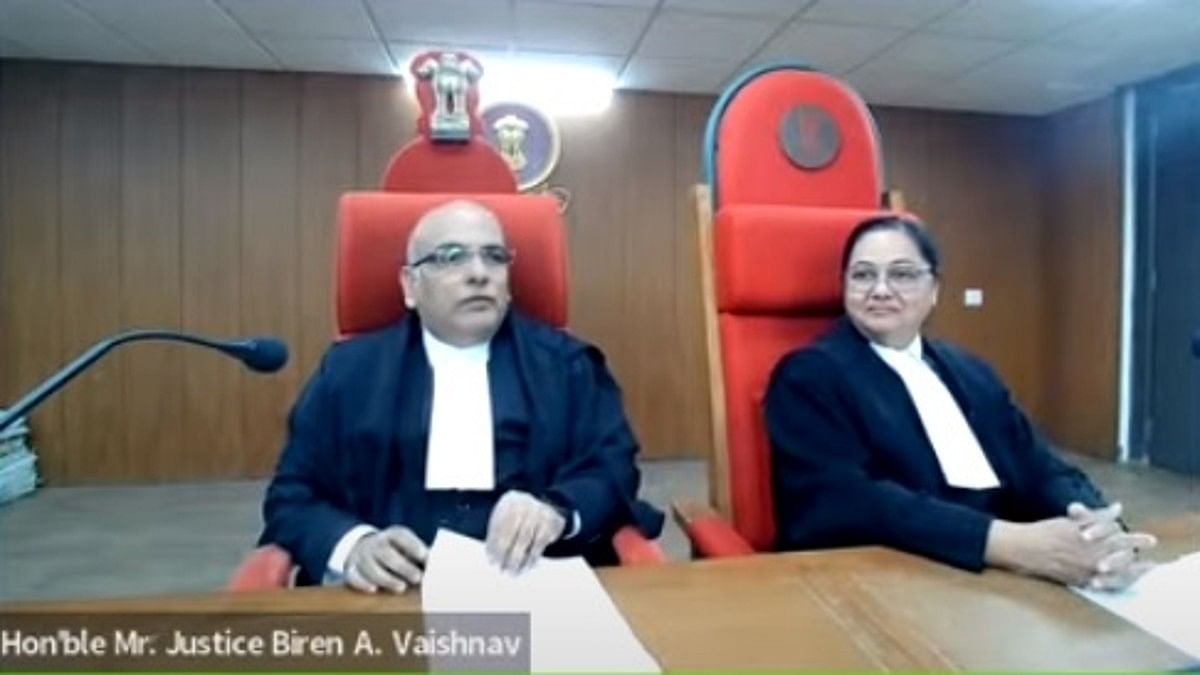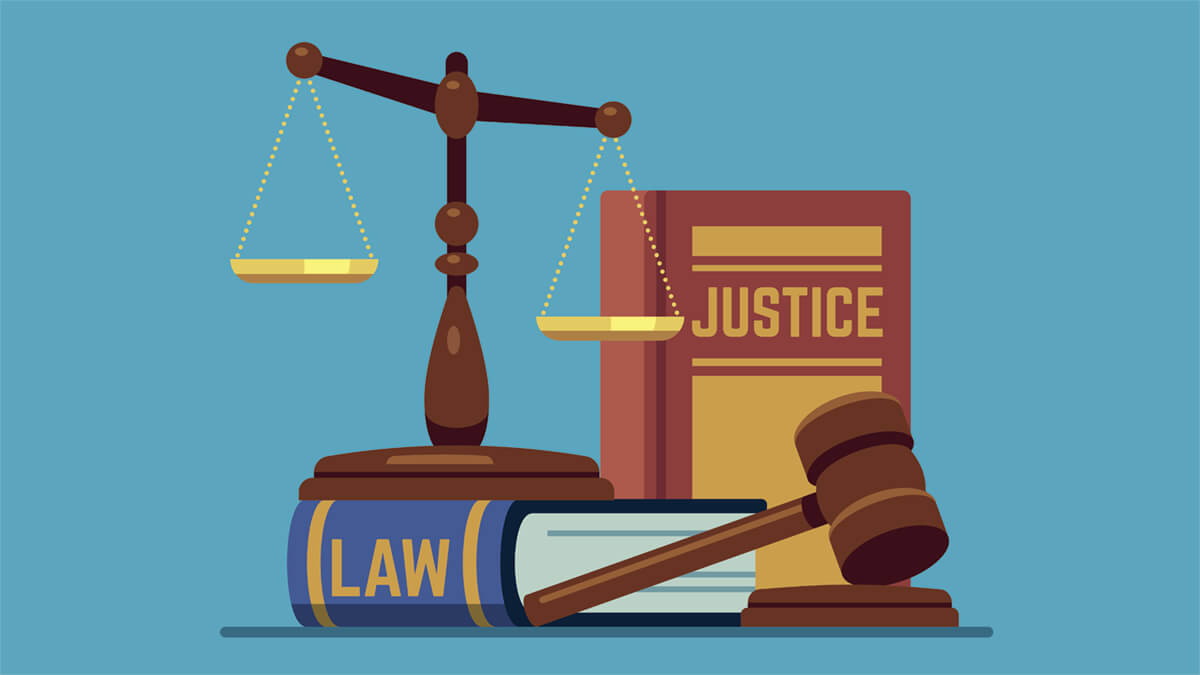Gujarat High Court Judge Biren Vaishnav Extends Public Apology to Colleague Amid Social Outrage
Gujarat High Court Judge Biren Vaishnav Issues Public Apology To Colleague in Open Court After Heated Exchange.

Gujarat High Court Judge Biren Vaishnav Extends Public Apology to Colleague Amid Social Outrage.
During Wednesday’s court session, Justice Biren Vaishnav of the Gujarat High Court extended an official apology to his colleague, Justice Mauna Bhatt, subsequent to a video recorded version of their heated dispute went viral on social media platforms. The event happened as an ongoing tax case was being heard by the division bench, which was presided over by Justices Vaishnav and Bhatt.
“Then you differ yaar. Then you differ. You have differed in one, differ in the other,” Justice Vaishnav can be heard telling Justice Bhatt in the video footage. “It is not about differing….”, Justice Bhatt tries to respond, however she is cut off by Justice Vaishnav, who says, “Then don’t murmur. Then you pass a separate order.” Justice Vaishnav then unexpectedly stated that the bench will not be hearing any additional cases today, following which he was seen getting up and leaving. The widespread dissemination of video on social media sparked a public outrage as well as prompted questions pertaining to the judiciary‘s conduct.
The online streaming link for Monday’s session was swiftly removed from YouTube by the Gujarat High Court, however unofficial versions of the video were still being shared on the internet. Due to Dussehra, the court was closed on Tuesday. Justice Vaishnav addressed the situation at the very beginning of Wednesday’s court session, publicly admitting that he had erred and issued a formal apology to Justice Bhatt in front of all the present attorneys and others in court. Before the session started, he stated that, “Before we begin the session, what happened on Monday shouldn’t have happened, I was wrong. I’m sorry for that and we begin a new session. It shouldn’t have happened, I don’t know, I was wrong.”
His apology was an attempt to acknowledge the inappropriate nature of the ensuing altercation as well as to express remorse for the way he behaved. The legal community as well as the public responded to the apology in different ways. Many applauded Justice Vaishnav for taking responsibility for his conduct as well as apologizing in public, highlighting the significance of accountability even in the judiciary. Others, on the other hand, voiced concern about the way the incident would affect the public’s opinion of the judiciary and urged for additional steps to guarantee the court’s integrity at all times.
The incident has triggered a broader discussion about the significance of professional conduct as well as decorum amongst judges, underlining the issues that the judiciary faces in an age where social media can instantaneously highlight any lapses in behaviour.

Gujarat High Court’s YouTube Stream Sparked Online Outrage Over Judge’s Outburst
When the video of this senior judge’s outburst at a colleague went viral, the Gujarat High Court, which habitually live-streams its proceedings on its YouTube page, found itself at the heart of a public controversy. The incident sparked a heated debate on social networking site X, with people expressing their concerns with regards to the episode’s ramifications for the decorum as well as professionalism of the judicial system. The video, which went viral on social media, shows an intense argument between Justice Biren Vaishnav and Justice Mauna Bhatt when on the course of a tax case.
In the video, Justice Vaishnav reprimanded Justice Bhatt, triggering a strong public backlash. Of particular note, the Gujarat High Court removed Monday’s streaming video for the relevant bench from YouTube as a result of the event. The incident’s public criticism as well as discussion centred on social media site X. Numerous users conveyed their dissatisfaction with the behaviour of the senior judge, that characterize it as “unfortunate” and drawing attention to the dynamics that exist between senior as well as junior justices on a courtroom bench.
A user highlighted the need of upholding equality in a division bench by saying, that both the judges have equal powers in a division bench. However, in most cases the ‘junior’ judge typically follows a senior’ judge’s decision mechanically. The purpose of having a division bench is actually defeated by this. It is sad what occurred at Gujarat High Court. Judges are not supposed to get this carried away. “True, they also have emotions, but they should express it through their orders and not by upsetting the decorum of the Court they themselves preside.”
Another user vehemently criticised the behavior of the judge, calling it as a “deplorable and irresponsible demonstration of chauvinism on the bench.” The user accused the senior judge of chiding his colleague in the manner of a bully, raising serious concerns with regard to judicial propriety as well as decorum to be followed in a court room.
A third user brought up the issue of gender sensitivity, raising an objection to the use of the term “yaar” by a senior judge when referring to a female judge on the same bench. They stated, “Judicial decorum and propriety can go bungee jumping! “, arguing it was improper as well as chauvinistic to reprimand a fellow judge publicly for voicing disagreements on matters related to facts or law. “Ought to be held accountable!”
The incident has raised awareness of the more general problem of upholding decorum, gender sensitivity, as well as professionalism inside the legal system. Although Justice Vaishnav, the senior judge, officially apologized to Justice Bhatt as well as everyone in the courtroom, it is still unclear how this episode will affect the continuing discussion about the reputation of the judiciary as well as the behavior of judges whether they are on or off the bench. This feeling highlights a crucial issue: in spite of the judges’ seniority, there must be mutual respect as well as equal participation in the process of decision-making.
One important point that the internet discussion brought to light was the dynamics of power inside a division bench. According to theory, both judges on a division bench have equal authority, as many people pointed out. In actuality, though, the “junior” judge frequently has a tendency to automatically agree with the “senior” judge’s rulings. As seen in the Gujarat High Court incident, this technique has the potential to defeat the goal of creating division benches as well as weaken the collaborative nature of the decision-making process in courts.
The event has sparked a discussion on respect as well as gender sensitivity in the legal system. Users expressed issues over the wording, that underscore that, regardless of the professional context, gender-appropriate language as well as courteous conversation ought to be upheld. This viewpoint emphasizes the requirement for a cultural change within the legal system to guarantee an accepting and courteous atmosphere for all judges, regardless of their gender. The incident also calls into question how transparent the legal system is. The Gujarat High Court’s habit of broadcasting live court proceedings on YouTube was a major factor in the incident’s rapid dissemination.
Transparency is important for a democracy to function properly, but it also comes with increased duty for all parties involved, which includes judges, to maintain the court’s decorum as well as dignity in the eyes of the public. In light of this incident, it is important for the judicial system, both in Gujarat as well as across the nation, to reflect and reinforce the standards of professionalism, equality, as well as gender sensitivity within its ranks of judges.
Judicial training programs which emphasize on interpersonal skills, ethics, as well as communication can play an essential role in shaping a more respectful as well as inclusive environment within the courtroom. The Gujarat High Court event serves as a sharp reminder of the challenges that the legal system faces in the era of social media, where every move is open to scrutiny by the general public.
It ought to be seen as a chance for the legal profession to reaffirm its dedication to the principles and standards of justice, equality, as well as respect, which are fundamental not only to the legal profession as a whole but to the community that strives for fairness and objectivity in its system of justice.

Upholding the Sanctity of Justice
The Gujarat High Court incident serves as a poignant reminder of the enormous responsibility that judges in our judicial system shoulder. While it is undeniable that judges are people with emotions and fallibility, it is crucial to understand that when they are in a courtroom, they transform into something more than just ordinary people. They take on the role of arbiters of justice, charged with the sacred duty of making sure that all parties are treated fairly, impartially, as well as with respect.
Judges are more than just the arbiters of justice in a court of law; they are its representatives. Their words, deeds, as well as decisions have an impact that extends far more than the courtroom, influencing how society views justice as well as the rule of law. It is this understanding that exposes their conduct, demeanour, as well as language under the microscope of public scrutiny. The incident emphasizes the critical need for judges to uphold the highest standards of professionalism and respect, not just towards those they serve but also towards their own colleagues.
The courtroom is considered to be temple of justice, and within its hallowed halls, every person deserves to be treated with dignity as well as fairness, irrespective of their position or gender. The selection of words, the tone of voice, along with the overall demeanour of judges significantly impact the perception of justice, which has an important influence on the amount of public trust and confidence shown in the legal system. Judges have a right to express their opinions and emotions, but it is crucial that they communicate these feelings in a dignified manner through their orders and decisions as opposed to through confrontations in the presence of the public.
Even when there is disagreement, acting professionally and with respect protects the integrity of the judiciary and sets a good example for the legal profession as well as society at large. The decisions and conduct of judges are constantly being scrutinized in the era of social media and quick dissemination of information. They must be acutely conscious of their duty as justice representatives in light of this reality.
Judges can strengthen the confidence of the public in the judicial system by continuously exhibiting professionalism, respect, as well as empathy toward everyone in the courtroom, which includes their colleagues. In doing so, they not only fulfil their legal obligation, but also contribute to the development of a society in which justice not only gets served, but is also seen to be served – a fundamental value upon which the entire essence of democracy is founded.





